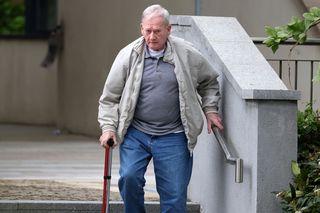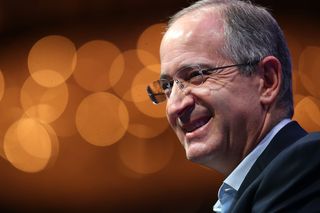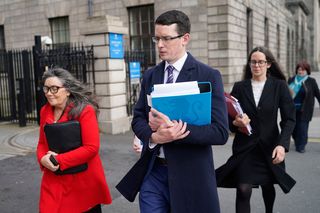Angel of the morning: Grainne Seoige gives her most revealing interview
The queen of television at just 38, Grainne Seoige's star is still in the ascendant.
Despite the axing of 'Seoige', the RTE show she presented with her sister, Sile, and the traumatic break-up of her marriage, the ground-breaking presenter hasn't looked back, she tells Aengus Fanning, landing a top job on UK television and determinedly shielding her young son from the media glare. And, as she gets ready to visit an Afghan warzone, the gorgeous Gaeilgeoir is still smiling. Photography by Barry McCall
She is known as the goddess from Galway who has taken her place in the glorious pantheon of beautiful women from the west of Ireland that includes Edna O'Brien and Dolly McMahon. And neither of them have had anything like the gruelling schedule, over many years, that Grainne has survived, with her talent unharmed and her beauty undiminished.
Grainne Seoige is the queen of television who has not lost the common touch, who has got on with the show no matter what pain she has been going through in her private life -- a private life she guards with the ferocity of a western lioness.
Nothwithstanding such formidable defences, she has had plenty of painful publicity in the past few months. Stories of the break-up of her marriage ran for weeks, and critics had a very good time sniping at her career moves after she left her daytime show, Seoige, on RTE.
As a woman, she has more courage than most men, and is smarter, too. As a single mother, she started her broadcasting career in Teilifis na Gaeilge, now TG4; always putting her son first and getting through with the help of her steadfast Galway parents.
Now she is a single mother again, although, for 11 years, Grainne, her husband, Stephen, and her son were a family unit, and she still praises Stephen for remaining at her side through thick and thin. And she is rightly proud of her achievement in seeing her son, Conall, successfully through to young adulthood.
And, when I met her earlier this month, she was still smiling, and getting ready to travel to Afghanistan with Daybreak.
Aengus Fanning: The whole country is fascinated with your career and your progress. You're now on Daybreak; how do you find that?
Grainne Seoige: I love it. I'm over and back every single week, unless I'm out foreign. I've been out on a lot of foreign trips lately, so when you're in Kenya for nine days it means you're not on screen for over two weeks. In the meantime as well, in the last month, I've also had two weeks of non-stop filming here in Ireland for The All Ireland Talent Show auditions, so it means that you mightn't be on air for a while, but you can't be in two places at the one time. Only St Brigid could do that.
AF: Well, I suppose it's a backhanded compliment to you that people are sitting in their armchairs and saying, 'we don't see much of Grainne'.
GS: Yeah, I do wonder about that. For instance, I'm going to Afghanistan on Monday, so all last week I did hostile-environment training. I'm going to a warzone, and you can never be too prepared for what might happen. Things like, if your leg gets blown off, what do you do? If you get shot in the lung, what do you do? Or, if somebody beside you gets shot, what do you do? First aid; how to behave if you're kidnapped? I've had an intensive course of training on how to handle those situations, and that's where I've been for the last week.
AF: And what will you be doing when you are there?
GS: I'll be reporting into Daybreak two live days next Wednesday and Thursday, mostly to do with Remembrance Day -- Armistice Day. I did it with Seoige before when we had troops out in Chad -- you're connecting troops with their families at home and it's a very poignant thing, that separation of time, distance; conflict. It's very, very tough. Yesterday I spent in RAF Benson in Oxfordshire with families of men who are out serving at the moment.
AF: It is a tribute to you, I think -- people are looking forward to seeing you on the screen, and, when you're not there as frequently as they might hope for, they ask, 'What's happening?'
GS: I suppose it's nice that people are interested. I suppose they don't know that even though I'm not on screen, I'm actually working flat-out the entire time. As I said, I was in Delhi at the end of August into the beginning of September. Daybreak launched the weekend I was doing Up for the Match here at home; I went back and did another week of Daybreak.
I came back for the People of the Year Awards; I went back and did another week of Daybreak; I came back and did the second Up for the Match. Then I was filming in Ireland -- The All Ireland Talent Show for two weeks -- and I was back on Daybreak. Then I went to Kenya for two weeks, then I was back on Daybreak, and then I was hostile-environment training, and now I'm going to Afghanistan! So it means I've been in neither office, if you know what I mean. I haven't been in RTE and I haven't actually been on screen in Daybreak either -- I'm either training to go to somewhere or I've been off somewhere.
AF: Would you say you're a very courageous person?
GS: Probably.
AF: And what do you think about that, or where would you say it came from?
GS: I think it comes from having a very strong set of parents who have a go-getting sort of attitude of, 'Don't sit there and let life take you by the hand, get up and take it by the scruff of the neck.' My parents are very hard-working people and I've a very strong mother who kind of said, 'Nobody's ever going to do everything for you, you've got to go out and do it yourself.'
I think, sometimes, that's the kind of quality that people admire in sportspeople. They don't expect it out of women, maybe, or they don't admire it so much in girls, but I've never been afraid to take a chance. You know, I always say, 'What's the worst that can happen -- it won't work out, and then what? At least you'll know you tried; don't die wondering.'
AF: In a way, I would sort of think about you -- you must have feelings at times where you feel you're on your own, really. You're out there, everyone is judging you, thinking of opinions, and all the hurlers on the ditch.
GS: There's plenty of them. We could field any amount of hurlers on the ditch in this country -- teams and teams of them, people who do nothing themselves but talk about everyone else. After a while I don't even read it; I've been hopping in and out of the country so much lately that you couldn't read it even if you wanted to, because I'm not here.
People have opinions and they're entitled to them, but, actually, you can only answer to yourself. 'Am I happy that I did my best? Am I happy that I took an opportunity when it came to me? Am I happy that I handled myself well in this situation?' For me, you can only answer for yourself, and I'm really happy.
AF: And where did you learn that wisdom?
GS: I remember my father bringing me into school when I was three and a half -- my first day in national school, and I actually really remember it well myself. He brought me in, and he always says, 'You walked in like a queen. Nothing bothered you, nothing fazed you.' I remember the beautiful brown dress that my mother had me in, a chocolate-brown dress, and I do remember sitting in my place and a lot of little girls around me crying, and I couldn't understand why they were crying; why they were upset.
I don't remember this, but I said to my father, 'Can I sit up at the top? I want to hear what the teacher has to say.' My father spoke to Sr Joseph, and she was really good to me. It was my first school, in Achill, and I do remember Sr Joseph, and I often went to see her after that. He said, 'Can Grainne sit here?' and she said, 'Absolutely, we're going to be great friends.' I've always been like that: if you do something, give it your best shot.
AF: And if you're making a new direction in your career, something ground-breaking, do you feel isolated that you're out there just ploughing new ground?
GS: I love that. I mean, TnaG, nobody had seen the like of it before in 40 years in Ireland. There was no other channel, it was Irish-language, and it was a new image for the Irish language. People forget what the image of the Irish language was before we started -- it changed.
Then I was fortunate enough to be part of the first independent broadcasting channel in Ireland, TV3, and then, by the time Sky News Ireland came along, I waited for the phone call but I really, really wanted to be a part of it because you become addicted to, as you say, breaking new ground and being at the forefront of something.
AF: And does it scare you?
GS: No.
AF: No? That's a wonderful way to be.
GS: It's just the way I am. I don't know if people misjudge it, or how people see it. I think people sometimes see -- I wouldn't even call it confidence, it's just self-belief. People don't always like to see it in this country, or they don't really understand it, but I think anybody who has ever achieved anything anywhere -- particularly here -- has self-belief.
AF: Your parents are remarkable people.
GS: They are, they're a remarkable couple, they really are.
AF: What are their names?
GS: Phil and Mairtin.
AF: Grainne, is there such a thing as being fearless?
GS: I think, in my case, if you become a mother at a young age, you confront everything in that one fell swoop. You're dealing with a human being coming into the world who's dependent solely on you, so you've got to get up and do it whether you like it or not.
It's like the stories you hear of -- I won't say I'm talking about Afghanistan, let's say men going off to war -- they get killed, and you've got a wife at home with kids. She's her own grief, but she can't even indulge it because life must go on. And life must go on, and that's always been my way.
AF: And is the secret to confront situations?
GS: Yeah, it's the only way: deal with what you have. It's the only way, and I think that's something we have in this country -- people not going to the doctor if they've pain because they don't want to hear the answer, whereas my feeling would be, go find out; then you can deal with it.
AF: Are women, by and large, stronger than men, in your opinion?
GS: I think men are more delicate.
AF: What do you mean?
GS: I think men's egos are more delicate than women's, and I think that changes how they behave towards women.
AF: Yeah, and is that because of the way their mothers brought them up?
GS: I'm not too sure, but I think women by and large have a lot more navigation to do in life. Our lives aren't as clean-cut or dried as men's are, and I think it means that you have to be stronger, more adaptable.
AF: And are women smarter than men?
GS: I think women can be cuter than men. I think also women can be much meaner than men to other women but the older I get, or the more mature I become, the more I realise that I've a fantastic sisterhood around me: fantastic, strong, honest, supportive, loving, encouraging women who only want love and happiness for you. I'm really fortunate to have that in my life and I'm really grateful for it, too. I've fabulous women around me.
AF: Sile is obviously one of them.
GS: Oh God, yeah, absolutely -- she's right up there. I said it, and people didn't believe it at the time, but that gift of working with her for the year, it was a gift because I always loved her. But because there was that age gap between us and we were working in different places, I didn't know her that well, and I really got to know her as a woman for that year. And, I mean, she went through an awful lot in the year that we worked together in the public eye, and it was a privilege to be there for her. She's just after coming back from Kilimanjaro and I can see the difference in her.
She's climbed the fourth-highest mountain in the world and I remember I sent her a text when she was down off the peak and I said, "Ce a seasamh seo di anois, Seoige?" -- "Who'd stand against you now?" You have put yourself to one of the greatest physical challenges on this earth to climb one of the highest peaks on the planet and you've done it, now who'll challenge you?
AF: Are these values more to be found in Ireland than in other countries, do you think?
GS: I don't think so. I think they're universal. I think human nature is human nature, human spirit is human spirit and you find that everywhere. I'm of this island, and most of the people I love are of this island so we have our own context for struggle. We've a lot of context for struggle in this country and even nowadays we have it, but I think that human condition exists everywhere.
You know, we have heroes everywhere, we have people we look up to everywhere, we have people who have struggled everywhere, but I come back to it again and again -- it's not always what happens to you in life that matters, it's how you handle it, it's how you respond that is really, really important.
AF: Are we different from other countries, if that's possible to express?
GS: Yes, we are. The more I work abroad, the more I realise how different I am. I think, actually working in the UK, they're an awful lot straighter than we are as an nation. Men and women, they're an awful lot more direct, whereas we finesse things in this country. We blather, it's part of our charm, it's part of what makes us who we are and it's probably what frustrates other people about us as well abroad. Things aren't on time: shure, I'll see you at two, or it might be half two, but shure, you'll be delighted to see me when I arrive!
That kind of thing, but I do know there's an awful lot of gra for being Irish abroad -- I'm talking about the UK, which is where I'm working half the time now. They love us -- they love the accent, they love the way we act, they love how we tell a story; they really, really enjoy it.
AF: I sometimes wonder though, right now. I mean, some mornings I get up and I kind of say I'm not going to talk about the recession although my job involves a fair bit of it, and the first person I meet, nearly, starts off about it. We do too much of it.
GS: I think we really do; the more you talk about it, the more it becomes visible -- you can't ignore things, but I don't think you need to be inundated with them either. And I do think we do an awful lot of that in this country, we wrap ourselves in a cloak of negativity here a lot of the time.
AF: Another thing you say which I find kind of interesting, 'It's not what happens, it's how you deal with it,' and I find a lot of us will say, 'Oh my God, this is happening to me -- why me?' It's a very common thing.
GS: Yeah, it is a very common thing. My philosophy is: You can't change what's happened to you, but you can change how you feel about it.
AF: RTE and all that kind of thing.
GS: I mean, I still have the second-biggest entertainment show on RTE, the second-highest-rating show after the Late Late, which is The All Ireland Talent Show. I have the People of the Year Awards, which is a very prestigious event to present -- which Gay Byrne presented for years and years -- and Up for the Match, which I love presenting because it really connects me with who I am. I remember ringing Mam and Dad the morning after the first Up for the Match -- it was the hurling Up for the Match -- and I was on my way to the airport. I was on my way to fly back to England, and I rang my parents to say thank you to them, and they said, 'why?' I said, 'Well, first of all I was reared in a house that loved sport, so I love sport, and therefore I'm able to present a programme like Up for the Match. You couldn't walk in and bluff that, you have to have it.
I was able to interview Micheal O Muircheartaigh last night as Gaeilge because of the upbringing you gave me, and I was able to do it because I have respect for other people and respect for what they've achieved because I'm interested enough, and that's what you gave me as well,' and I actually got really emotional on the phone. I said, 'Only for ye, I wouldn't have done what I did last night.' People look down on programmes like Up for the Match because they think they're easy to do. They are not; you're sitting in front of people who are legends of the game for generations and hard-core fans for that county. You have to respect their traditions, respect what they've achieved, bring to bear your own upbringing on it, invite people in -- people who might be brilliant sportsmen, but not brilliant talkers. There's a lot involved in that, and I'm so fortunate that I've worked with someone like Des Cahill who's an amazing broadcaster and wears it very lightly.
He doesn't wear it with 'I'm a sage.' He doesn't go on like that, and he's totally bought into me being part of that team. We've done it for three years now so that's six of those programmes but, like I said, having that upbringing . . . so I did Up for the Match the week before I interviewed Gordon Brown. So it's an amazing thing, what has come.
AF: And you have to have a very quick, agile brain to keep the right questions coming, to follow through with things, to follow up.
GS: Particularly on live television, because you don't allow for delay on live television.
AF: You've been very careful to keep your private life private on the basis that you were talking earlier when you said, 'OK, it might create a vacuum speculative journalists and media will fill with their own,' but you've decided very consciously anything you say will only give legs to it.
GS: Absolutely, and that's always been my philosophy. It's the reason why people seize on any small thing that I do say, but that's never explain, never complain -- it is my motto.
AF: What of the future?
GS: At the moment, everybody is working towards the future, but the future is over the brow of the hill. I love the experience I'm getting in the UK, travelling to places I've never seen before in my life. It's an amazing opportunity; who knows what will come of it? At the same time, I'm really glad to be working in RTE, to still have that connection here and particularly at a very high level; they are very big shows. I suppose I am at a bit of a crossroads in my life.
A new chapter opened for me this year, but all you can do is, as my father said, 'Do this day to the best of your ability and tomorrow will look after itself.' It's coming anyway, you can't do anything about it. Just do today the best that you can, and be happy, be as happy as you can be with today and tomorrow comes and looks after itself.
AF: I know from our earlier conversation that you have a good breakfast, a nice lunch and quite a good dinner as well, and yet you are svelte and slim. How do you do this?
GS: I work hard at it. I work out. I go to the gym twice a week with Paul Byrne. I go when I am here on a Monday and I go when I come back on a Friday. It's the reason that I am able to serve the two masters. It's the reason I am able to work in the two countries, because I am physically fit.
AF: And even if you are very tired, you will still go to the gym?
GS: Yes, I will, because I always feel 10 times better afterwards. You go and you feel tired, but you come out and you feel fantastic.
AF: Self-discipline -- where did you get that from again, back to that question?
GS: I don't know, I think there is a fair bit of self-discipline at home, because everybody belonging to me has never been shy of work, but I think some of it comes from yourself, your own inner strength. I think it is imperative that you keep yourself. I am my own product, I am my own machine. If I don't work, I don't get paid, it's like everybody else, but the added thing is I work in the media, so I need to keep myself. I would compare it to being a sports person -- they need to do what they need to do to make sure that they can line out every Saturday or Sunday and I need to do what I need to do to make sure that I can make it to air at 6am or 10am or whatever. You keep yourself healthy, you look after yourself.
AF: You were actually born in Mayo?
GS: Born in Mayo, but reared a Galway girl.
AF: When the chips are down?
GS: When it comes to Connacht-final day, I am wearing maroon.
L
Diffusion, 47 Clontarf Rd, D3, tel: (01) 833-1592, or see www.diffusion.ie
Susan Hunter, 13 Westbury Mall, Grafton St, D2, tel: (01) 679-1271, or see www.susanhunterlingerie.ie
Havana, Anglesea House, Donnybrook, D4, tel: (01) 260-2707, or see www.havanaboutique.ie
Nijou, Unit 23 Royal Hibernian Way, D2, tel: (01) 633-4306
Photography by Barry McCall
Assisted by Paul Canning
Styling by Liadan Hynes
Assisted by Jennifer O’Dwyer
Hair by Michael Leong using Shu Uemura at Reds, 21 Dawson St, D2, tel: (01) 678-8220
Make-up by Zoe Clark. The next Zoe Clark
Make-Up School introductory course runs from
December 2-5, see www.zoeclark.com
Join the Irish Independent WhatsApp channel
Stay up to date with all the latest news














